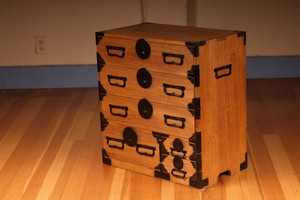

This vintage Japanese small chest (Ko Tansu, 小箪笥) is a beautiful and practical piece from the Meiji era (1868–1912). Crafted with care from sugi wood (Japanese cedar) and kiri wood (Paulownia), it represents the artistry and utility of traditional Japanese furniture. The metal corner reinforcements were added not only for aesthetic appeal but also to ensure durability and resistance to wear, reflecting the pragmatic craftsmanship of the time. The larger drawers feature decorative lock plates, showcasing intricate metalwork that was often both functional and ornamental.
During the Meiji era, Japan experienced rapid modernization and westernization, but traditional crafts like tansu-making remained integral to daily life. Small tansu such as this one were designed for convenience and functionality, making them ideal for personal storage. They were commonly used to store clothing, documents, or household items in smaller living spaces. The compact design and lightweight nature of kiri wood, known for being insect-resistant, made these chests highly versatile and easy to transport.
Today, small tansu from this period have become highly sought after for their practicality and timeless design. They are often repurposed as end tables, nightstands, or compact storage solutions in modern interiors, bringing a touch of historical charm and Japanese minimalism to contemporary spaces. The enduring appeal of Meiji-era tansu lies in their ability to harmonize form and function, embodying Japan's rich cultural heritage while fitting seamlessly into today's lifestyles.
20 1/4"W x 13"D x 22 1/4"H